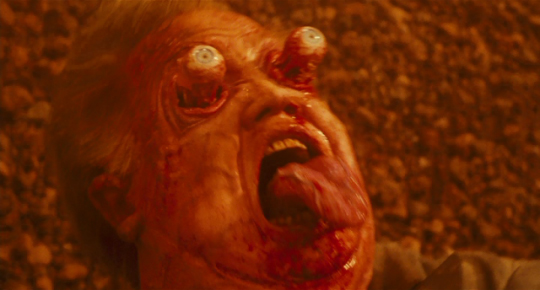WARNING: SPOILERS.
 |
| death on Mars, "Total Recall" (1990) |
Death on Mars can't be a pleasant prospect. The planet has an atmosphere, but only just barely. Scientists describe that thin layer of gas as a near-vacuum. It may well be that Mars was once teeming with life—or, at least, it was a planet covered in water. The evidence of that water is all over: there are imprints resembling channels, deltas, rivers, and possibly even oceans. But now, the world is dead. We've been to Mars via probes and rovers, and up to now there's been no sign of life. Mars is arid and frozen, and dying on its surface would be a bleak death, indeed.
Self-described science nerd Andy Weir's get-me-home novel The Martian is the futuristic story of Ares Mission astronaut Mark Watney, who wakes up after a disaster to find himself alone on Mars. His team abandoned him for solid, plausible reasons: there had been a storm; NASA had scrubbed the mission after only six "sols" (Martian days); Watney had been struck by flying equipment; the Mars Ascent Vehicle (MAV) had been tilting dangerously in the wind, threatening to strand the entire team; Watney's suit had stopped broadcasting life signs. All evidence pointed to Watney's death, and a fruitless search by teammates would have led to more deaths than just Watney's. The man was alone—Mars' sole citizen.
The rest of the story, initially told purely from Watney's point of view (he keeps some sort of journal), is about Watney's efforts to survive, to reestablish contact with NASA on Earth, and to get home. Watney is a botanist, and one of his main priorities is to grow enough food to survive for however long it will take for NASA either to send supplies or to send a rescue team. That could mean years. How do you grow potato crops when Martian soil has no bacteria? For that matter, there are other survival issues to face: how do you keep yourself supplied with potable water? If your CO2 scrubbers are unusable once they're saturated, how do you get rid of excess CO2? If you've lost communication with Earth, what can you do to reestablish it? If you're trying to navigate across a barren, flat planetary surface with no obvious landmarks, what celestial guideposts are there?
Weir's novel is a testament to his science-nerd status. He has obviously thought through almost every detail of what an actual, manned mission to Mars would be like, from the equipment used to the problems one might face, to the jury-rigged solutions one might conjure up in response to problems caused by either the Martian environment or by one's own mistakes. Weir covers it all in very readable technical prose interspersed with flashes of Watney's humor and wit. The tone of the novel feels almost like something Michael Crichton could have written, but without becoming cartoonishly ridiculous or overly didactic.
Is it really a surprise, or a spoiler, to learn that Watney makes it back? Americans can't seem to write space-disaster stories that end in tragedy. The movie "Apollo 13" is a prime example of this (granted, it's based on a true story); so is the film "Gravity." Both of these are movies about just making it home after everything has gone to hell. In Watney's case, his personal mission involved surviving for more than eighteen months on the surface of the Red Planet, eating nothing but vitamins and potatoes, and bathing almost not at all.
After the first few chapters, the novel startlingly changes from first-person narrative to omniscient third-person so that we can be privy to what's happening on Earth. Watney gets most of his help from NASA, but the Chinese also elect to scrub a mission they had spent years preparing for in order to give the United States a much-needed booster rocket to launch supplies. Watney's team is initially kept in the dark about the fact that Watney is still alive, but the team members end up being crucial to rescuing Watney as they turn their ship, the Hermes, around to do a Mars flyby in the hope of catching their abandoned teammate while he's launching off the Martian surface.
For a story that covers over eighteen months, The Martian moves along at a steady clip, and we share Watney's mounting excitement and dread as he finally reaches the Ares 4 MAV, strips it of all nonessential weight, and launches himself off the planetary surface. Despite the foregone conclusion, Weir keeps our interest. My only real complaint is that I would like to have seen the story told exclusively from Watney's point of view, but I can understand why Weir shifted perspective throughout the book: there's simply too much story to tell, and it won't all fit inside one man's perspective.
The movie version of this novel, directed by Ridley Scott and starring Matt Damon as Watney, is coming out in Korea soon. I'll be curious to see how Hollywood handles all the science nerdery. Weir wrote his novel in a "hard science fiction" vein, i.e., he wrote with a deep respect for actual physics. Hollywood, with its penchant for "Hollywood physics," could very well muck this up. Here's hoping that that doesn't happen.






No comments:
Post a Comment
READ THIS BEFORE COMMENTING!
All comments are subject to approval before they are published, so they will not appear immediately. Comments should be civil, relevant, and substantive. Anonymous comments are not allowed and will be unceremoniously deleted. For more on my comments policy, please see this entry on my other blog.
AND A NEW RULE (per this post): comments critical of Trump's lying must include criticism of Biden's or Kamala's or some prominent leftie's lying on a one-for-one basis! Failure to be balanced means your comment will not be published.